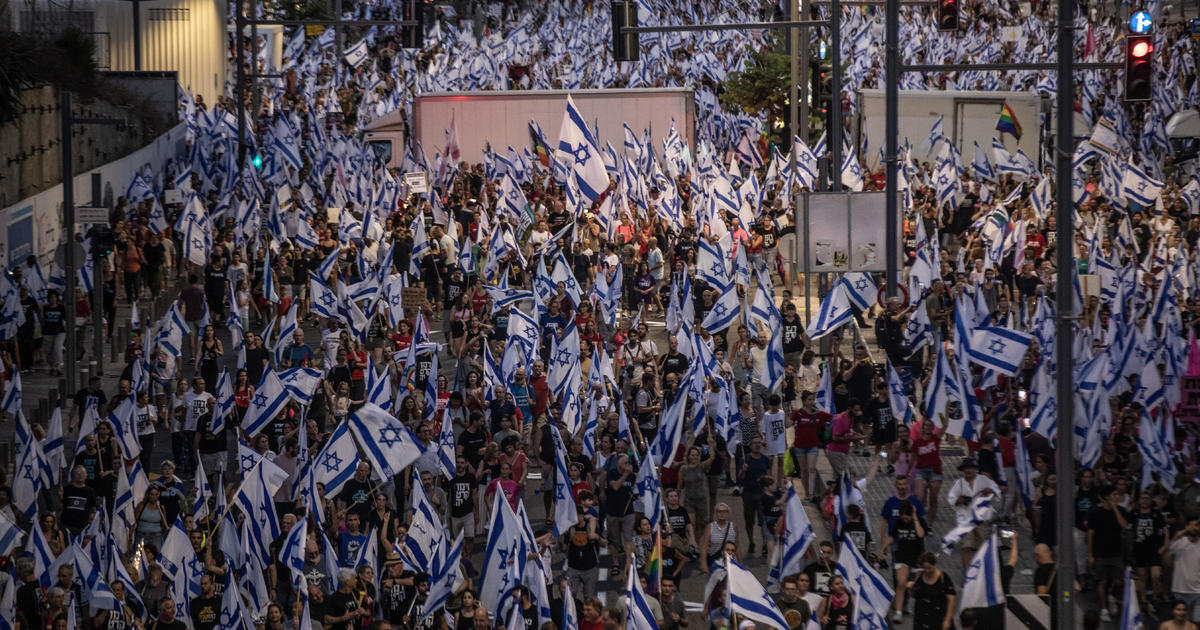Thousands of Israelis flooded the streets on Saturday to demonstrate against the government’s decision to push forward with its controversial judicial reform package, despite widespread opposition. The protests, which took place in Tel Aviv and other cities across the country, were a continuation of the months-long movement against Prime Minister Benjamin Netanyahu’s proposals.
Film composer Itay Amram, one of the demonstrators, expressed his love for the country and the collective effort to address the issues at hand. However, he, like many others, strongly rejected the government’s “constitutional revolution.”
The protests in Tel Aviv were particularly significant, with thousands of people waving Israeli flags and voicing their concerns. The atmosphere was characterized by a determination to resist the government’s plans. Images from the rally captured the spirit of the demonstrators, illustrating the passion and unity among the protesters.
The demonstrations were not limited to Tel Aviv; cities from Haifa to Eilat participated in what is considered the largest display of public opinion since the final vote on the proposed reforms. The vote to eliminate the “reasonableness” law, which grants the Supreme Court the power to overturn government decisions, has raised concerns among Israel’s key allies, including the United States.
The impact of the protests has already been felt, as Israeli medics conducted a brief walkout in response and numerous military veterans have pledged to end their volunteer duties. Trade unions are also considering further industrial action. While Netanyahu argues that the reforms are necessary to balance power between elected officials and the judiciary, his opponents accuse him of seeking greater control over the government.
Placards seen in Tel Aviv warned against servitude to a dictatorship, reflecting the frustrations of the demonstrators. The turnout for the protests in Tel Aviv alone was estimated to be over 170,000 people, demonstrating the widespread opposition to the government’s plans.
In Jerusalem, near the prime minister’s residence, a protester named Lotem Pinchover expressed her feelings of heartbreak and helplessness after the vote. She expressed concerns about the future of her daughter and the current state of Israel. The protests have highlighted divisions within Israeli society, leading to fears of further societal fragmentation.
Therapist Pnina Manes, stationed at a support stand for protesters in Jerusalem, described the situation as tearing families apart. She remarked with sadness that Israeli society now feels like two distinct groups. Multiple petitions opposing the vote have been filed at the Supreme Court, with hearings scheduled for September.
In addition to the controversial “reasonableness” law, the broader reform package includes measures to give the government more influence in the appointment of judges and downgrade the status of legal advisers attached to ministers. The legislative process is currently on hold due to parliament’s summer recess, but Netanyahu has expressed willingness to engage in negotiations for future steps.
However, opposition leaders remain skeptical about negotiating with the government, as earlier attempts at dialogue have failed. The current coalition government includes far-right and ultra-Orthodox Jewish parties.
The protests in Israel have sent a strong message to the government, illustrating the deep-rooted concerns and opposition to the intended judicial reform package. The fight for the preservation of democratic institutions and a balanced distribution of power continues, with the hope of finding a resolution that respects the rights and aspirations of all Israeli citizens.
Denial of responsibility! VigourTimes is an automatic aggregator of Global media. In each content, the hyperlink to the primary source is specified. All trademarks belong to their rightful owners, and all materials to their authors. For any complaint, please reach us at – [email protected]. We will take necessary action within 24 hours.


